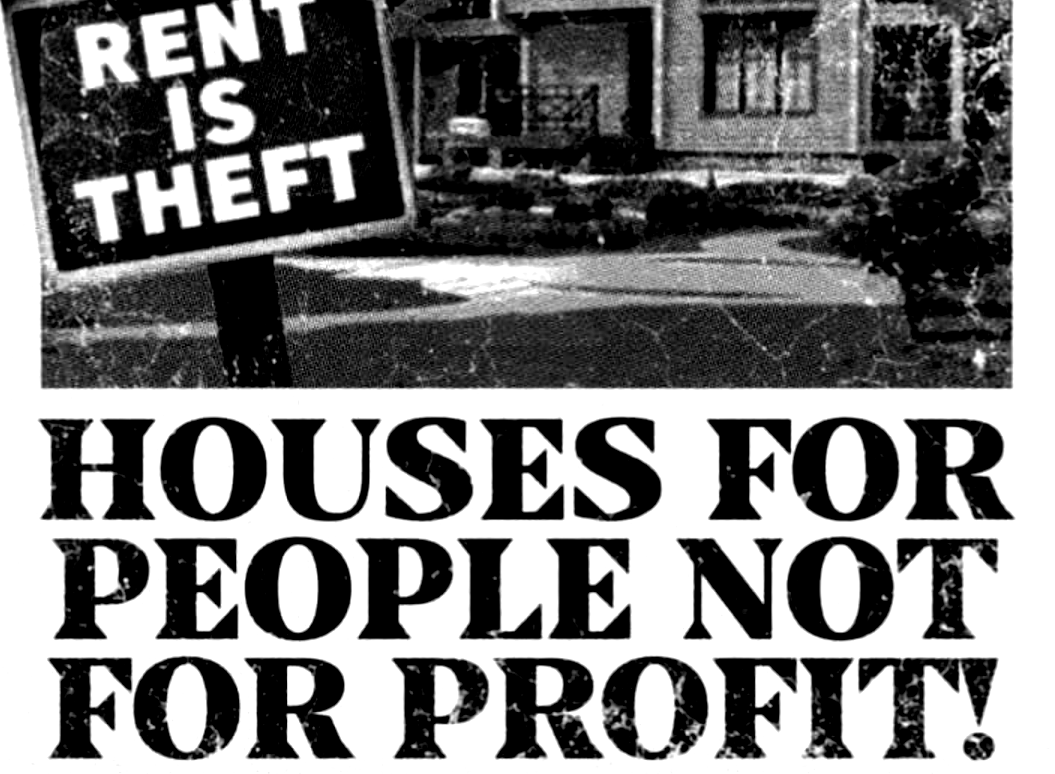Position paper by the GDC Housing Working Group
Under capitalism, housing is a commodity. In the U.S., housing for the sake of living is less and less important, and increasingly treated as an investment. In other words, the cost of housing is calculated by its exchange value rather than its use value.
In the General Defense Committee’s everyday work we observe the effects of the 2000s financialization of housing. Real estate is the new investment, as it is considered a “safe” investment (for the investor). Luxury real estate that exists for the purpose of investment is being prioritized while affordable housing is being destroyed. As David Madden points out in Inequality and the Commodification of Housing, “Investment companies see affordable homes as underperforming assets.”
Housing is about more than an individual’s home. It is a building block to organizing our communities, and to agency in our neighborhoods and our cities. Consider cities that are open-air prisons, company towns, bedroom towns, sundown towns. Consider gentrification, surveillance, displacement; the exodus of people from cities that are too expensive to live in anymore, and the continuous replenishing of the state’s reserve army of labor. It is abundantly clear that cities are not neutral. They are battlegrounds. These issues may be more hidden in rural areas, but class struggle exists everywhere housing exists in the United States.
The LA Tenants Union (LATU) defines tenants as “those who do not have control over their housing/shelter”, which includes those who are homeless and those who are incarcerated, expanding housing beyond its “traditional” meaning, to an issue that affects everyone. The GDC recognizes that these struggles are interconnected: The working class renter is often one paycheck away from becoming homeless, and homeless people are frequently targeted by police.
In our struggles, we have also observed local governments unwilling to allocate money to tenants unless it involves direct payouts to private entities. Existing nonprofit styles of trying to address housing instability only line the pockets of landlords and landowners. This looks like emergency spending on hotel sheltering, eviction diversion funds ($ for rent), and inflating the budgets of failing social services — NOT public housing, eviction moratoriums, or inflating the budgets of grassroots organizations, to name a few of the bare-minimum alternatives that are not being addressed.
The GDC doesn’t say it’s too much when people say they want to fight back. Each time the church says no, each time the nonprofits say no, but the GDC says yes, it reveals holes in the capitalist system. Ripples begin from human-based relationships which can challenge people’s notions of the world and how it’s supposed to be. A ripple begins from social understanding and transforms into political understanding.
Why Housing
EVERYONE NEEDS HOUSING.
Housing is a core need that determines how people are able to show up in the world, how autonomously we can move, live, and exist, what sort of support we’re able to give others, and the amount of agency we can express or impose over space.
We recognize housing as a right. The United States does not.
In Ypsilanti, Lansing and Detroit, the fight for control over housing is a site of class struggle.
The workplace is no longer a ubiquitous site where working class people are concentrated in struggle. This is a due to the increase of part-time and remote work, and the shift in many industries from stable employment to temporary hiring and “gig” work. For example, many of the neighborhoods in Ypsilanti Township were essentially built as workforce housing for auto manufacturers. After the factories closed, the people still living in these neighborhoods today lost that workplace connection. This breeds alienation; an estrangement stemming from the division of labor, which makes us feel a loss of control over our own life and our relationships; and makes organizing difficult. However, people still share similar connections through their housing, such as apartment complexes. In Ypsilanti and Detroit, renters make up between 60-70% of the population, in Lansing it’s almost 50%. There’s an opportunity here to build on those connections.
The working class tenant finds themself exploited in both the workplace and in their home. Anyone can be a renter, but for working class tenants, landlords extract rent from us on top of the daily disenfranchisement of surviving under capitalism. In the U.S., some recent studies place expenditures for half of American renters as paying 30% of their income as rent. For the rich well-to-do, the petite bourgeoisie, the professional managerial class, or monied capitalists that rent, this may only be a minor annoyance. For workers and the broader masses, this represents a slow-moving crisis. From all sides in this country, the masses are being squeezed for more of their income, returning less and less essential goods.
Where large property management companies and landlord barons control the majority of rental properties (such as in Ypsilanti with Beal Properties owning some 60% of rentals), a regime of landlord despotism arises: Terrible conditions, lack of basic utilities, poor general management, arbitrary punitive measures on tenants and, finally, evictions. Housing conditions are indeed rapidly deteriorating as fast as rents rise. For example, in the Ypsilanti Tenants Union we receive reports of ceilings caving in of apartments with $1,000+ rents, broken appliances and moldy infrastructure.
While the housing crisis has had many different spikes of tension, the two most recent and critical levels came during The Great Recession and the COVID-19 lockdown faced by every country across the globe. The 2008 recession caused by banks and loan sharks defrauding everyday people resulted in record levels of evictions, loan defaulting, and removal from homes. While those injuries here were still fresh, management companies, property speculators, developers, and vultures swooped in to purchase up these properties and homes at low costs to continue hoarding necessary shelters for profit down the road, or slapping shoddy paint over the walls, outlets, everything to hike up the price and resell it for a more lucrative investment in an example of disaster capitalism, the victims left to their own devices. During the COVID-19 pandemic beginning in 2020, many working class people lost their lives and livelihoods, either by having to work to pay rent/mortgages during a global health emergency or their primary sources of income shutting down for public health precautions. We will continue to see these spikes happen even more frequently as rents continue to increase and barriers to entry on home ownership continue.
Many working class renters are only one 2008 style crisis away from joining the stratum of the “lowest and the deepest” — becoming homeless. And those experiencing homelessness are the individuals who feel the full brunt of the Capitalist boot on their neck in the Housing struggle. They are the ones who face the many fronts of Capitalism’s cruelty on a complete scale: from routine harassment by Capitalist thugs, hunted down by capital (debt) collectors, dehumanization by non-profit organizations/city officials masqueraded as charity or philanthropy, and the abandonment of the existing system to the perils of climate. In order to survive in their state of dispossession, homeless individuals necessarily come in antagonistic conflict with the pigs and American legal apparatus. They are punished both for the active steps of social engagement they take to survive, like being arrested for petty theft, and are punished for their passive existence on inconvenient land, such as having their campsites raided by the pigs. For these reasons, homeless individuals have the potential to be primed for revolutionary action and energy, however stalled by the necessity of survival at many (all) junctures.
Not having control over living space has been a material unifier among GDC members and the neighbors/neighborhoods in which we organize. Organizing around control of shelter and housing also aligns well with the community-defense model of the GDC. Housing work is a way to meet our neighbors and engage in mass work. Meeting people, struggling together, is how we make lasting connections.
As tenants, we are able to change our conditions through struggling against a landlord or other common enemy. The GDC does housing work because it’s a necessary site of class struggle. It is one of the areas where we can most intimately create change in people’s immediate conditions, while also acting in ways that align with our vision of the near and distant future; housing for all, decommodified spaces, political bases, liberated territory, flexibility in the use of space, building people’s agency and power both individually and together.
Finally, as Malcolm X reminds us in Message to the Grassroots, “Revolution is based on land. Land is the basis of all independence. Land is the basis of freedom, justice, and equality.” Housing struggles are about land struggles as well. In the same way that cities are not neutral, the GDC is not neutral in this struggle for land, liberation, and agency.
GDC’s Housing Work So Far
The General Defense Committee conducts housing work through external organizations like Washtenaw Camp Outreach (WCO), Ypsilanti Tenants Union (YTU), Detroit Eviction Defense and Moratorium Now. GDC members are also supportive of and engage in projects such as Solidarity House, Peace House, Mercy House, Weather Amnesty, Daytime Warming Center, and Grace in Action.
Housing work in the GDC has aimed to balance survival programs and relationship building with challenging property relations and fighting against attacks of capital on tenants. We have struggled to conduct consistent political education in the communities that we organize, but have not struggled to convey our principles and communicate political priorities.
Solidarity Hall in Ypsi has provided a physical space to execute our survival program and socialize without/with less hierarchy. This space has been critical to the growth of GDC and integration of the masses into the larger organization. It also encourages the overlap and collaboration of all of our areas of work. In 2023 we held art builds for Palestine during open hours at Solidarity House. WCO, YTU, and community groups have their regular and impromptu meetings in the hall. Reading groups and letter writing happens at the hall, and we use it to print survival guides, zines and propaganda to flyer the neighborhood. During GDC’s office hours we use the space to play cards and eat meals together while having political discussions and streaming revolutionary music. Before direct actions and events we have a space to plan and prepare, and afterwards, to debrief and care for one another. This space has been possible because of coalitions in the homeless community — with churches, nonprofits, grassroots organizations and individuals — and has exposed people we organize with everyday to anti-capitalist, revolutionary politics.
Our newer office spaces in Lansing and Detroit (Grace in Action) — while not liberated spaces as we pay rent here — have been central to hosting similar events and to meeting our neighbors. Prison letter writing, art build, propaganda making, meetings and discussions that are held during office hours have helped build connections in our communities.
Incarceration and criminalization of poverty are responses to the heightened desperation of people who are faced with housing insecurity and homelessness. And incarceration and criminalization are also necessitated by gentrification and displacement of poor and working class people, often Black, who must be criminalized in order to smooth the process of our removal from the cities we grew up in. We conduct prison letter writing during open hours because a lot of us know someone inside. Visiting our friends in jail and putting money on their books, therefore, is also a part of our housing work. Housing work and abolition work are intimately tied together.

